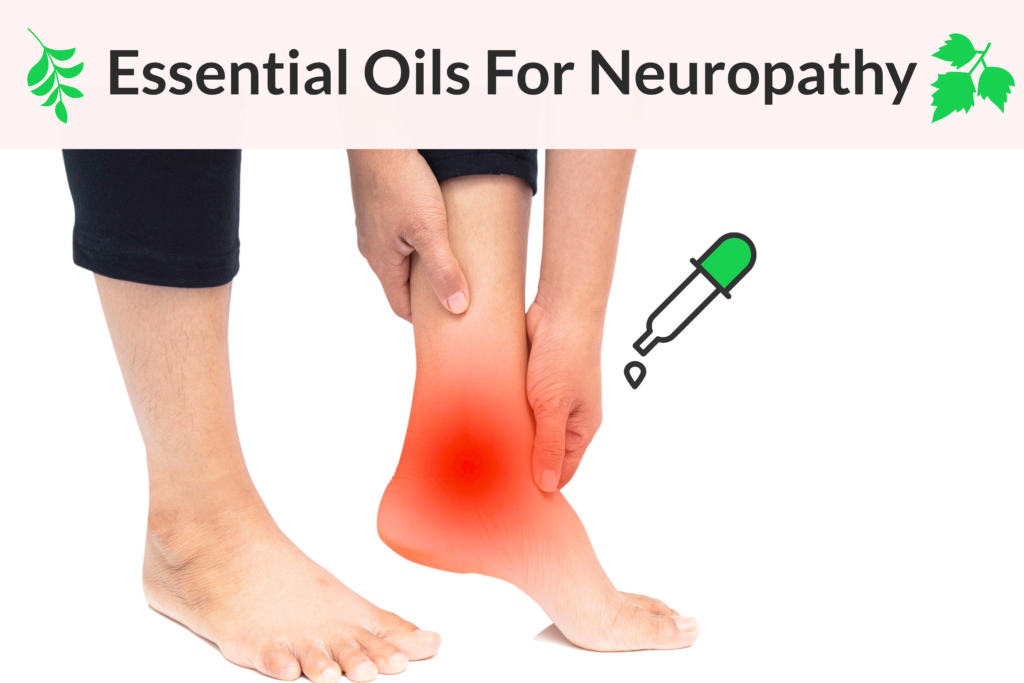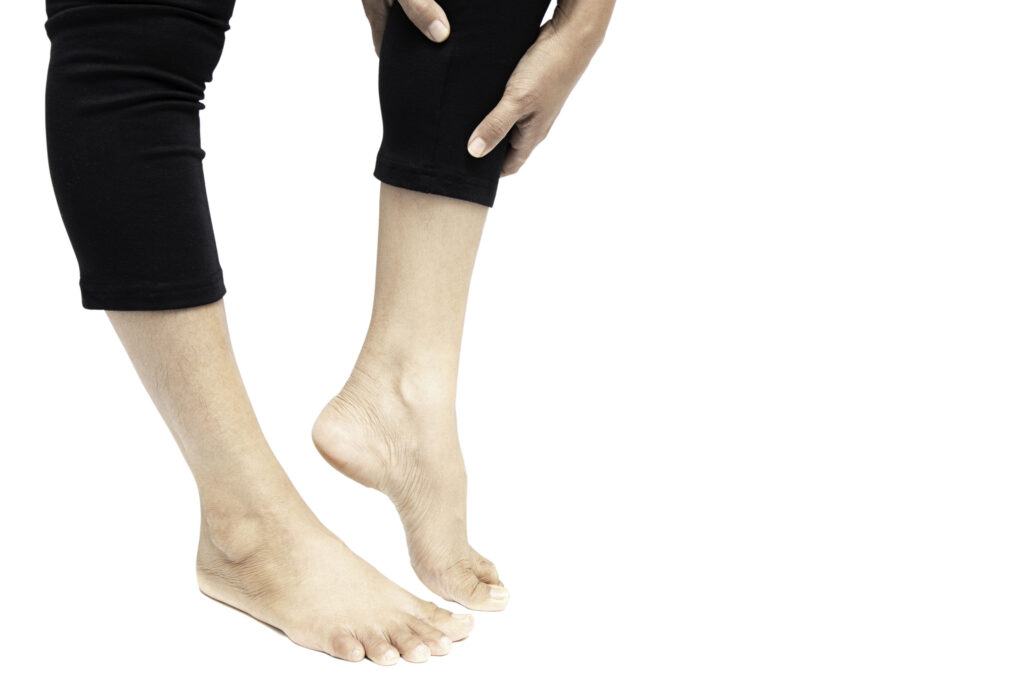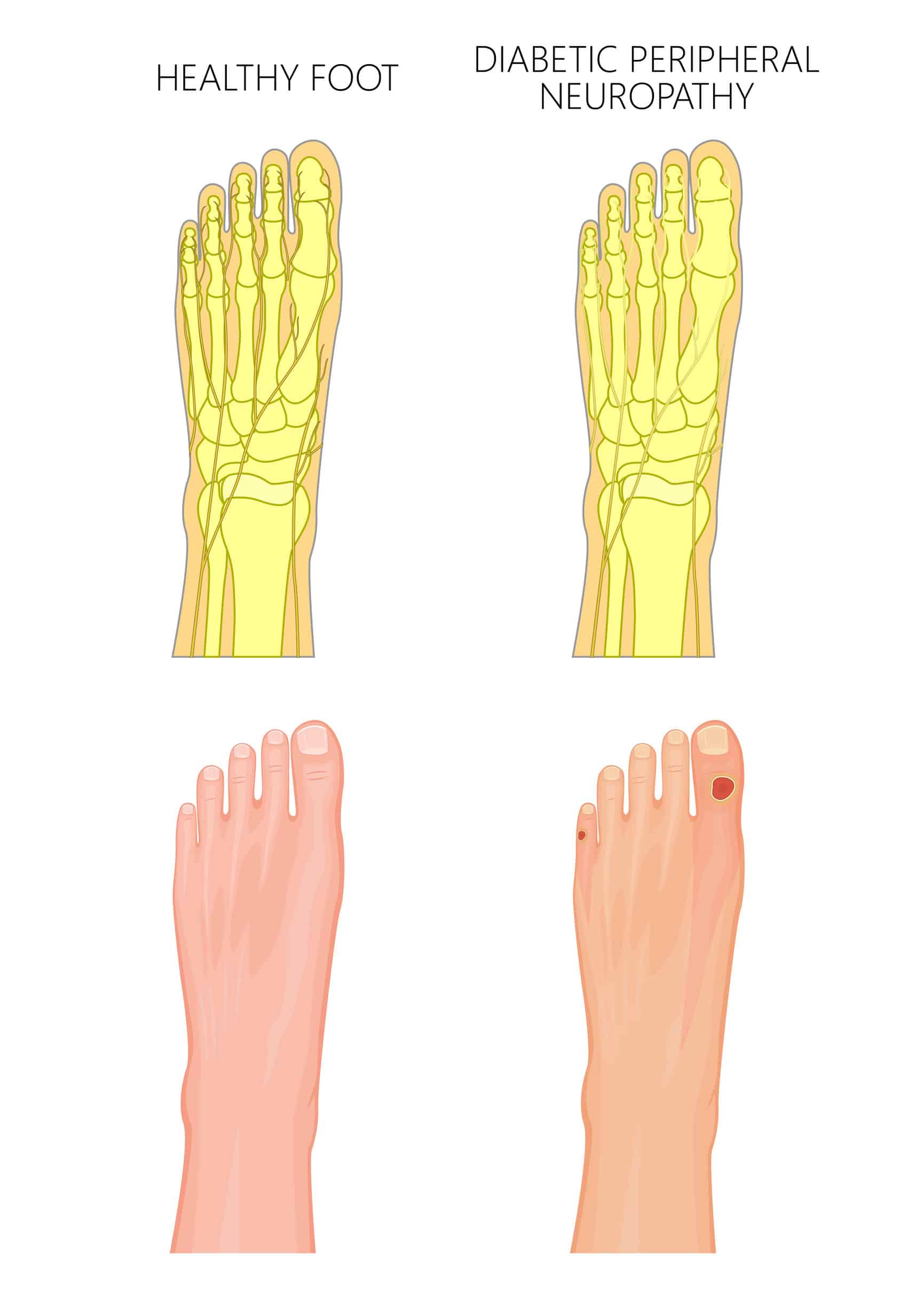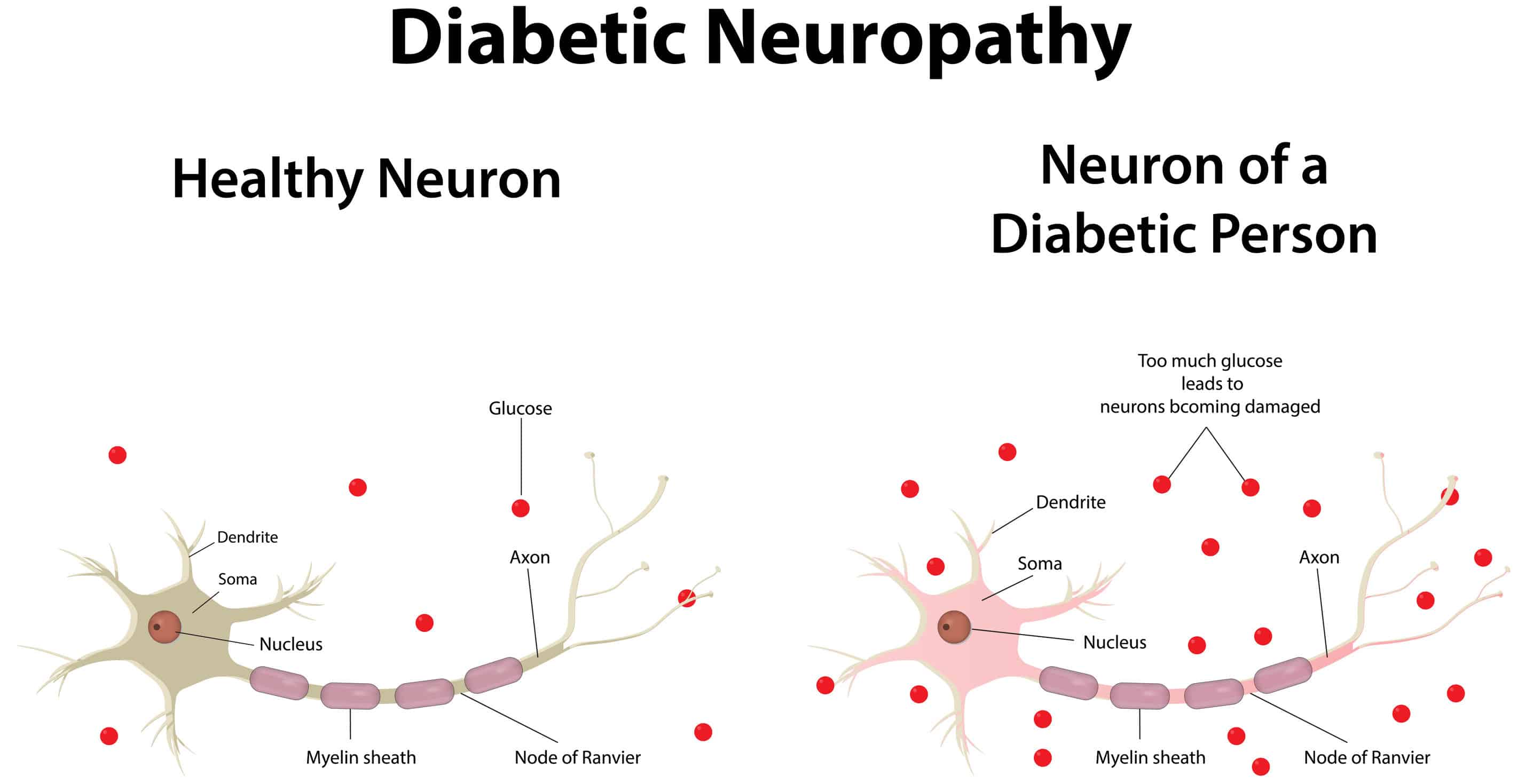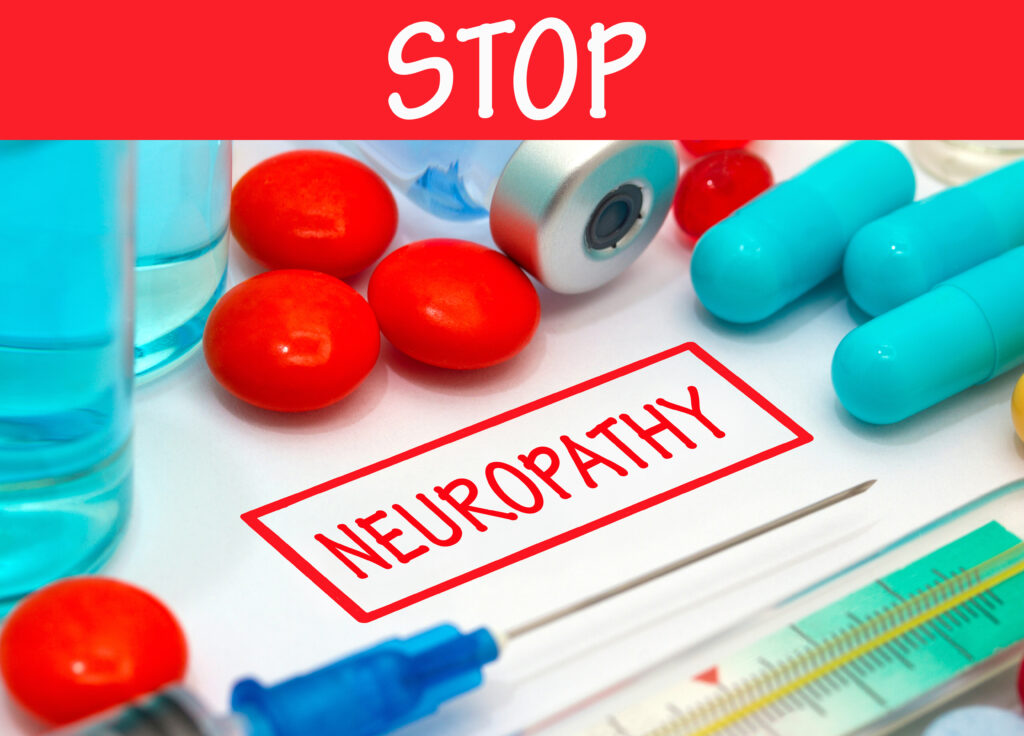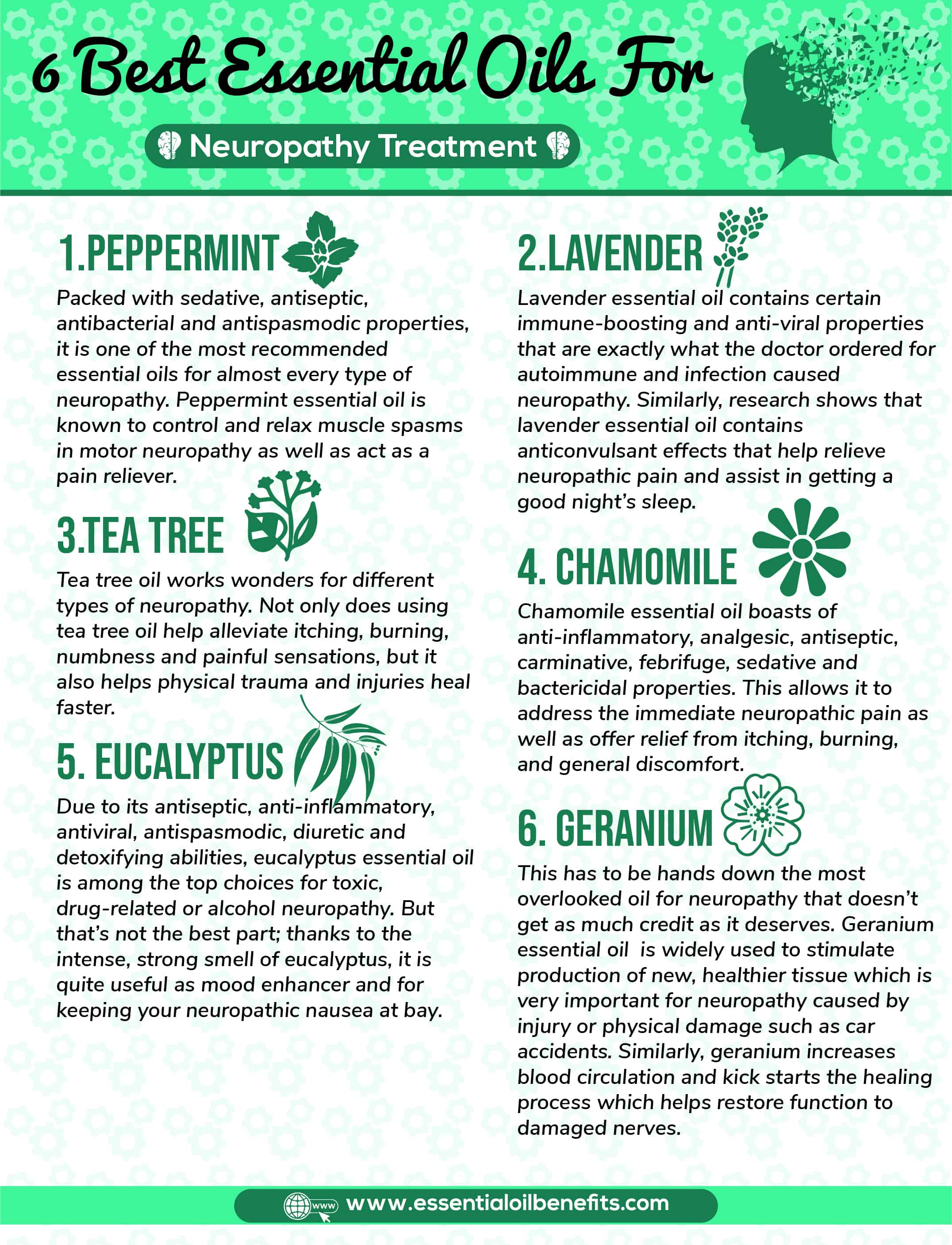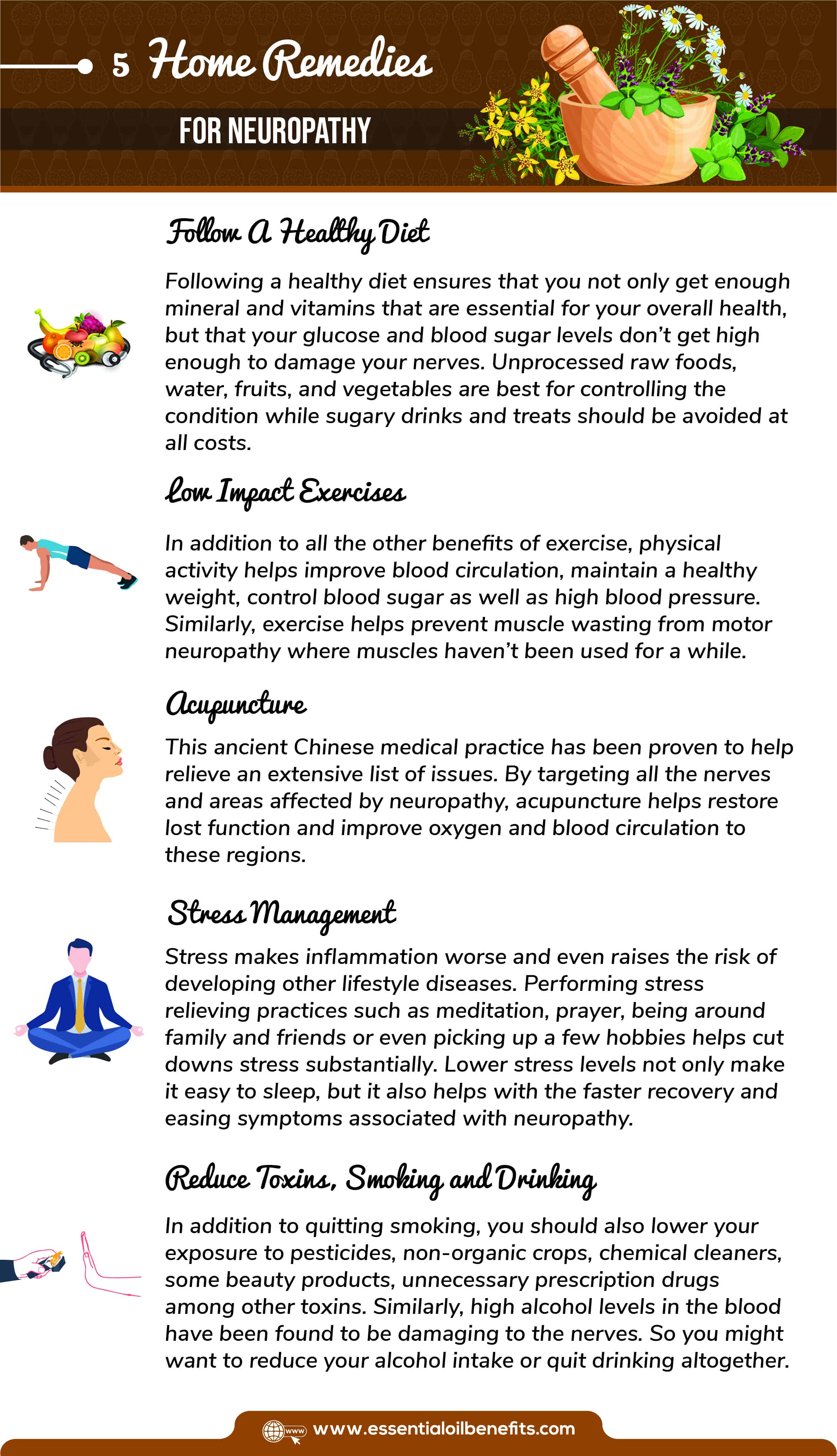Great news folks; if you’ve ever been called a pain in the neck, butt, nerve or literally any other body part, someone might have just been trying to teach you about a particular medical condition known as neuropathy.
Today, we’ll be learning a bit (in fact a lot) about neuropathy, what it really is, how it presents itself and all the different types there are out there. We’ll also be looking at how you can treat and manage the condition as well as some outstanding natural remedies (essential oils and home remedies) for all types of neuropathic pain.
I know you’re not exactly comfortable and at ease so I’ll try to keep this as short and as painless as possible while still being comprehensive. Plus, a little fun and humor along the way wouldn’t hurt so much (unless you have motor neuropathy, then it’s going to hurt when you laugh).
You know it; this here’s the ultimate, mother of all guides to everything you need to know about neuropathy.
What Is Neuropathy?
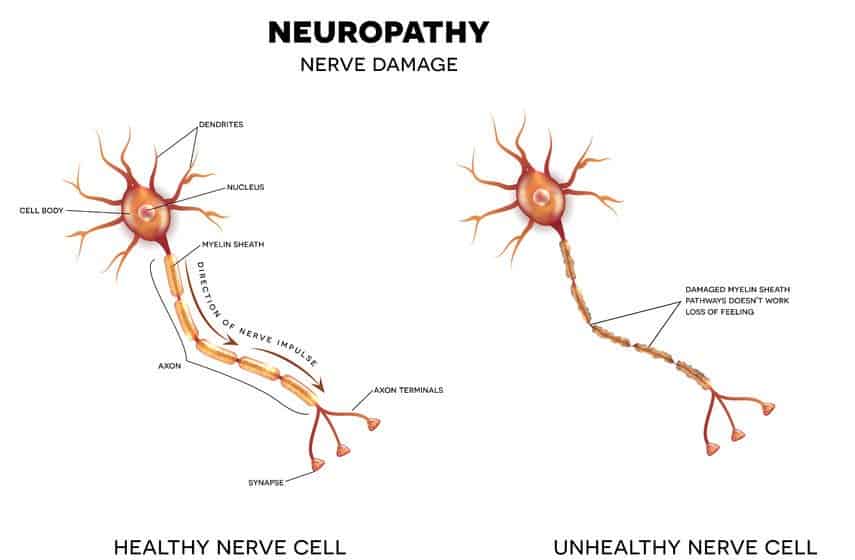
Neuropathy is a medical term that refers to general disease or malfunctions of the somatosensory nervous system. Seeing as the nerves are located in any part of the body, any damage to the system due to trauma or disease might impair sensation, motion, organ or gland function as well as a few other aspects of health depending on the nerves affected.
Now, remember that time you bumped your elbow and felt shocks and chills racing through your entire arm? Yeah, I bet the damn thing went cold and numb after that, am I right?
Well, normally, nerves carry messages between the brain to every single part of our bodies; making it possible to hear, see, feel, move, and a whole bunch of other functions.
The nerves also carry an entire array of signals that we’re not even aware of to organs such as the heart, lungs and others. So when you hit your elbow that time, what you did was temporarily disrupt the messages from your arm to your brain. Fortunately, things returned to normal shortly after.
In the case of neuropathy, however, these effects are long term, chronic, unrelenting and sometimes severe. Patients have described it as a shooting, burning, itching or numbing sensation that closely resembles stabbings, pins and needles or electric shocks.
But again, this all depends on the type of neuropathy you have. We’ll look into the symptoms later on. The condition can be brought about by a number of various conditions including physical trauma, repetitive damage or injury, infection, disease, metabolic issues, toxins, drugs, amongst others.
This takes us to our next segment on how neuropathy is classified and all the different types there are.
Types Of Neuropathy And Their Symptoms
As I was saying before I was rudely interrupted by that blasted subheading, neuropathy is often classified according to the location or types of nerves that are affected. However, it can also be classified according to the causative agent, type of damage or disease causing it.
I’ve compiled all the common types of neuropathy and other types of neuropathic disruptions that you didn’t even know existed. They’re all conveniently listed below, so errr… whenever you’re ready.
1. Classification According To Affected Nerve Type
a) Sensory Neuropathy
This type of neuropathy affects the nerves responsible for collecting sensory information about the body. This includes all the nerves that carry messages of touch, pain, temperature, and other sensations from the skin all the way to the brain.
Primarily, sensory neuropathy mainly affects the nerves in the legs and feet, but other people also develop the condition in the arms and hands. Sensory neuropathy usually presents itself with the following symptoms:
- Tingling and numbness in arms and legs
- Loss of the ability to feel pain
- Loss of ability to detect some changes in temperature
- Deterioration of coordination as your sense of joint position diminishes
- Burning, itching or shooting sensations
This can be a very dangerous condition, especially when you can’t feel minor cuts and injuries. There have been numerous cases where patients of sensory neuropathy had broken bones that went unnoticed. As a result, the bone heals abnormally causing a deformity known as charcot joint.
b) Motor Neuropathy
This is a type of neuropathy that affects those nerves which monitor the conscious movement of your muscles. Since these nerves directly control movement, any damage, injury or malfunction results in weakness of the affected muscles.
This means that the motor nerves are unable to receive messages from the brain which can lead to symptoms such as:
- General muscle weakness
- Total loss of specific motor skills
- Twitches and cramps in muscles
- Muscle wastage due to lack of inactivity
- Paralysis
c) Autonomic Neuropathy
This is without question the most brutal type of neuropathy of them all. See, autonomic neuropathy affects the nerves that regulate and control the involuntary functions of the body. These include nerves that regulate bowel control, stomach emptying, digestion, sexual activity, respiration, and even the heartbeat.
Considering that we didn’t even have control of these functions in the first place, you can imagine how devastating the condition can be. Autonomic neuropathy usually presents itself with the following symptoms:
- Gastro-paresis where food can’t move through your digestive system efficiently causing constipation, bloating or diarrhea
- Involuntary loss of bladder control causing incontinence
- Irregular heartbeat and palpitations
- Issues with sweating and cooling mechanisms
- Impotence and inability to perform sexual activities
2. Classification According To Nerve Location
d) Cranial Neuropathy
This type of neuropathy occurs when any of the twelve nerves that exit directly from the brain are damaged. Two of the primary forms of cranial neuropathy include optic and auditory neuropathy. Optic neuropathy is where the nerves that transmit visual signals to the brain are damaged.
Auditory neuropathy affects the nerves that carry sound signals from the inner ear to the brain. As you would expect, the main symptoms of cranial neuropathy include losing or diminishing sight, sound, taste, smell among other senses.
e) Peripheral Neuropathy
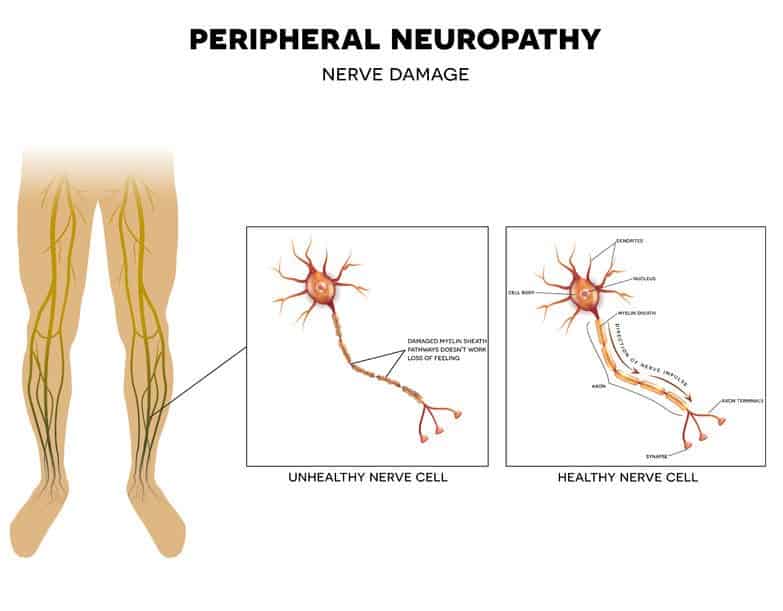
This is by far the most common type of neuropathy that affects approximately 20 to 30 million people in the US alone. Peripheral neuropathy refers to a problem with your body’s peripheral nerves which are responsible for transmitting messages from the central nervous system and spinal cord to the brain and rest of the body.
What makes this particular type so rampant is that not only can it affect the sensory, motor and autonomic nerves, but it can also pick out a set of nerves or even one single unlucky nerve to attack. This means that it can impact a broad range of different areas in totally different ways.
As a result, peripheral neuropathy is a phenomenon all on its own that deserves more than a quick mention. But before we get to the types of peripheral neuropathies out there, I have to really drive in how serious this condition can get.
I’m sorry if it gets tough and emotional along the way; but having seen its effects first hand, you’ll understand why I have to do this.
Types, Symptoms And Effects Of Peripheral Neuropathy
If you’ve been diagnosed with peripheral neuropathy, there’s only two ways about it and only one ending. It’s either chronic peripheral neuropathy which starts out slow and subtle and progresses slowly but surely, or acute peripheral neuropathy that seems to come out of nowhere with sudden onset, rapid progress, and even more gradual resolution.
Depending on whether it affects the motor, sensory and autonomic nerves, you could be looking at a very long and intimidating list of symptoms such as: incredibly painful cramps, muscle twitching, changes in the hair, nails and skin, muscle loss and weakness, bone degeneration, impaired balance, loss of coordination, numbness to touch, loss of pain reception, reduced sensitivity to temperature, extreme sensitivity to non-painful stimuli, spontaneous burning, itching, tingling or pins and needles.
The worst part is when all the autonomic functions give up – you then end up with a reduced ability to sweat normally, inability to digest food, loss of bladder control, abnormal blood pressure and irregular heart rates.
The good news is that the condition is entirely manageable, but we’ll get to that pretty soon, I promise. But for now, I’d mentioned that peripheral neuropathy can impact a wide range of different areas in totally different ways. I’d like to take this chance and list out some common types of peripheral neuropathy.
i) Single Nerve Neuropathy (Mononeuropathy)
This refers to neuropathy that only affects a single nerve. It’s actually more common than you think. Some examples of mononeuropathy include:
- Ulnar Neuropathy – where the elbow nerve is affected
- Radial Neuropathy – as the name suggests, this type affects the nerve in the arm
- Peroneal neuropathy – affects the nerve leading to the knee
- Femoral neuropathy – type that affects the thigh
- Cervical neuropathy – not what you think guys. This type actually affects the nerve in the neck
- Bell’s Palsy – affects a single nerve across the face
ii) Polyneuropathy
Occasionally, two or more isolated nerves get damaged or injured, resulting in what the doctors refer to as mononeuritis multiplex neuropathy. And when multiple nerves all malfunction at the same time, this is known as polyneuropathy.
I wish I could make some of these words up, but I hear you need some sort of PhD for stuff like that.
Now that I’ve touched on all the common types of the condition, it’s time to move on. Yes, I know I didn’t talk about the last type of neurotherapy that is classified according to the causative agents. But don’t you think that segment would be well suited below? After all, we are looking at the causes of neuropathy, right? Glad we’re all in agreement.
Causes Of Neuropathy
While doctors are sometimes unable to pinpoint the precise cause of neuropathy (idiopathic neuropathy), there are really only two ways you can get it – neuropathy can be either inherited at birth or somehow acquired later in life.
We do know that the primary cause of neuropathy is nerve damage, but how exactly do your nerves become damaged?
There are a number of different systemic diseases, infections, injuries, autoimmune disorders and even deficiencies that could all lead to various types of neuropathy. Let’s take a closer look at all the causes of neuropathy.
1) Systemic Disease
This is a disease that affects the entire body. Some of the most common systemic diseases that cause neuropathy include:
Diabetes
This is one of the conditions most associated with neuropathy. In fact, over 60 percent of people with diabetes tend to have some degree of neuropathy.
The reason for this is because high blood-sugar levels damage the tiny blood vessel walls responsible for supplying oxygen and nutrients to the nerves located at the far end of your hands, feet, and essential organs such as kidney, heart and eyes. This leads to loss of sensation and performance in all these areas.
Kidney and Liver Disorders
Any disease of the liver or kidney could allow high levels of nerve damaging toxins to circulate in the bloodstream. As you would expect, this will cause different types of neuropathy as well as other ailments.
Hormonal Diseases
This includes hyperthyroidism that disrupts metabolic processes that cause tissues and other body parts to exert pressure on certain nerves.
2) Infection
Numerous infections from bacteria, viruses, and other sources can attack nerve tissues either directly or indirectly causing some forms of neuropathy.
Some of these infections include lyme disease, shingles, HIV, diptheria, epstein-barr virus, leprosy, syphilis, among others.
3) Physical Trauma and Injury
If a nerve suffers from severe isolated physical trauma, it can become permanently damaged causing certain types of neuropathy. This could be as a result of a direct blow that either crushes, compresses, stretches, or even severs the nerves.
Trauma and injuries arising from motor vehicle accidents, sports injuries, falls, and others could all cause damage to the nerves and cause neuropathy.
Similarly, nerve damage can also be as a result of intense pressure on the nerves such as from broken bones of an ill fitted cast where prolonged pressure could cause neuropathies such as carpal tunnel syndrome.
4) Autoimmune Disorders
In this case, autoimmune disorders cause the body’s immune system to start attacking and destroying healthy tissues. This can often lead to nerve damage and multiple cases of neuropathy.
Some of the most common disorders include multiple sclerosis, sjogren’s syndrome, lupus, guillain-barre syndrome, rheumatoid arthritis, among others.
5) Toxins and Poisons
Certain chemical compounds can really wreak havoc on our nervous systems and cause irreparable damage. These toxins include exposure to heavy metals such as mercury, arsenic, lead, and thallium, industrial solvents, organophosphate pesticides and even nitrous oxide.
6) Alcohol, Drugs, and Medication
For years, alcoholism has been long associated with nerve damage due to a combination of direct damage from alcohol and vitamin deficiencies common in alcohol abusers.
Similarly, certain drugs and medications such as antibiotics, antivirals, anticonvulsants, anticancer meds all have a high chance of damaging your nerves and triggering neuropathy.
Prevention, Treatments, Cures And Remedies For Neuropathy
According to statistics, neuropathy is one of the most difficult nerve conditions to treat with less than 40 percent of people only managing to achieve partial relief. That’s because in addition to being a progressive disease for most, it’s usually the result of irreversible nerve damage.
That doesn’t mean that you shouldn’t make all efforts to both avoid and treat the condition. I know you’ve been waiting for this segment for a while, so I’ll cut the chatter and dive right into it, shall we?
Preventing Neuropathy
When it comes to preventing neuropathy, blood sugar management as well as general health is crucial. So, while some types of neuropathy that result from accidents and injuries can’t be avoided, you can take care of your body by ensuring you don’t suffer any deficiencies or avoidable diseases or overindulge in alcohol. Other steps you can take to avoid the condition include:
- Keeping blood glucose levels within range
- Having your feet regularly checked
- Consult with your physician if you have diabetes for closer monitoring
- Physical therapy is crucial after injuries and accidents
Treating Neuropathy
When it comes to neuropathy, the treatment varies largely based on the causative agent, as well as in addressing the underlying condition. For diabetes, managing the higher blood sugars will help prevent further nerve damage and manage the neuropathy.
For toxic and poisonous causes, eliminating the suspected toxin or drug intake will also help prevent any further damage to the nerves. As for autoimmune causes, systemic diseases and vitamin deficiencies, treating and remedying each individual cause will eradicate the cause of nerve damage.
However, the effects of nerve damage tend to be permanent, progressive and long-term. As such, people with neuropathy find themselves dealing with its effects such as tingling, burning, itching, neuropathic pain, loss of sensation, nausea and vomiting, indigestion, respiratory, circulatory, and digestive problems as well as an entire host of other health issues. In that case, the best option is to offer relief for some of the symptoms as well as manage the condition as best as you can.
I’ve compiled all the medications and medical devices that can help, natural alternatives that have been proven effective as well as home remedies you can use to find relief from the symptoms of neuropathy.
Medical Treatment Options For Neuropathy
1) Anticonvulsants and Antidepressants
When it comes to almost all types of neuropathic pain, antidepressants and anticonvulsant drugs are considered the first and most effective line of treatment. These drugs act on the central nervous system to offer relief for most of the symptoms and effects of various types of neuropathy.
Medication such as gabapentin, carbamazepine, oxcarbazepine, milnacipran, duloxetine, venlafaxine, and desipramine have all been proven to reduce pain and discomfort associated with neuropathy.
2) Cannabinoids
Not surprisingly, cannabis and a number of other cannabinoid receptor antagonists appear to be quite effective for managing symptoms of neuropathy (not that I have tried it!). However, the mild and well-tolerated psychoactive side effects of cannabis limit its use as medication against neuropathy.
3) Opioids
Also known as narcotics, opioids are increasingly becoming a crucial treatment got chronic pain of any sort. Although they are not considered the first line of treatment for neuropathy, they still remain incredibly effective.
But due to the illegal nature and risk of addiction, opioids are only used for some individuals and under very close medical supervision. Several options currently in use for neuropathy management include ketobemidone and methadone.
4) Medical Devices
Some medical devices have been used to alleviate the symptoms of several types of neuropathy. These include transcutaneous electrical nerve stimulation therapy and implanted spinal pumps that use electrodes to disrupt nerve signals.
Best 6 Essential Oils For Neuropathy Treatment
In a 2010 study, researchers administered a homeopathic topical oil to 60 neuropathy patients with different types of pain. The blend included the essential oils of lavender, bergamot, tea tree, geranium and eucalyptus.
Out of the 60 patients, 56 reported a substantial decrease in pain within 30 minutes, and other benefits after long term use. Do I need to say more?
Essential oils have been used for centuries and are widely popular for their healing properties. Thanks to their therapeutic properties (anti-inflammatory, antiseptic, antiviral, analgesic, antispasmodic, sedative, antimicrobial), these oils hold plenty of potential when it comes to treating and managing several forms of neuropathy.
What’s more, they have been known to soothe the mind and body, alleviate stress, balance the hormones, treat cuts and scrapes as well as help people with neuropathy sleep better.
I’ve compiled a concise, short list of only the best and most effective essential oils for neuropathy.
Top 6 Essential Oils For Neuropathy
1. Peppermint
By now, you’re probably wondering if there’s anything that peppermint can’t do. Packed with sedative, antiseptic, antibacterial and antispasmodic properties, it is one of the most recommended essential oils for almost every type of neuropathy.
Peppermint essential oil is known to control and relax muscle spasms in motor neuropathy as well as act as a pain reliever. What’s more, peppermint oil is great for treating the digestive and respiratory system. Lastly, the menthol in peppermint offers unrivaled cooling effects with excellent aromatherapeutic benefits.
2. Lavender
Extracted from the Lavandula angustifolia plant, lavender essential oil comes packed with a ton of valuable properties.
In addition to being an anti-inflammatory, antibacterial, antioxidant, sedative anesthetic, lavender oil contains certain immune-boosting and anti-viral properties that are exactly what the doctor ordered for autoimmune and infection caused neuropathy.
Similarly, research shows that lavender essential oil contains anticonvulsant effects that help relieve neuropathic pain and assist in getting a good night’s sleep.
3. Tea Tree
Here’s another must-have staple that any oil collector worth their salt should never lack. Tea tree oil with its medicinal properties acts as an anti-fungal, antiseptic, antimicrobial, cicatrizant and immunostimulant and works wonders for different types of neuropathy.
Not only does using tea tree oil help alleviate itching, burning, numbness and painful sensations, but it also helps physical trauma and injuries heal faster.
4. Chamomile
Widely used as one of the most effective remedies for anything anxiety /depression related, Chamomile essential oil boasts of anti-inflammatory, analgesic, antiseptic, carminative, febrifuge, sedative and bactericidal properties.
This allows it to address the muscle spasms, uncontrolled muscle twitching as well as offer relief from general sleep related issues caused due to neuropathy.
5. Eucalyptus
When it comes to anything to do with the respiratory system, nothing beats good old eucalyptus essential oil. Due to its antiseptic, anti-inflammatory, antispasmodic, antibacterial, antiviral and antifungal abilities, eucalyptus oil is among the best choice for toxic, drug-related or alcohol neuropathy.
But that’s not the best part; thanks to its intense, strong smell, eucalyptus is quite useful as mood enhancer, nasal passage clearer and for keeping your neuropathic nausea at bay.
6. Geranium
This has to be hands down the most overlooked oil for neuropathy that doesn’t get as much credit as it deserves.
Geranium essential oil is widely used to stimulate production of new, healthier tissue which is very important for neuropathy caused by injury or physical damage such as car accidents.
Similarly, geranium increases blood circulation and kick starts the healing process which helps restore function to damaged nerves.
Recommended Natural Product For Neuropathy
Before I get to the recipes, let me introduce the L’orpur pain relief blend – it has proven extremely effective against all types of pain-related issues, including sciatica pain, nerve pain, hip pain, knee pain, you name it.
Whether you are experiencing weakness, numbness or pain from nerve damage in your hands and feet, I have full confidence that L’orpur pain relief blend will help you treat the symptoms of neuropathic pain effectively!
5 Best Essential Oil Blends / Recipes For Neuropathy
Recipe 1: General Neuropathic Pain Blend
Essential oils:
- 5 drops Chamomile
- 4 drops Marjoram
- 4 drops Lavender
- 2 drops Geranium
- 30 ml (1 oz.) coconut, sweet almond or macadamia as carrier oil
Method:
Combine all the essential oils in a glass jar and top off with your choice of carrier oil in a glass bottle. Cap the bottle and shake well to mix everything together.
Apply twice a day to areas of the body where pain is experienced such as arms, legs, back, neck or other areas.
Recipe 2: Peripheral Neuropathy Blend
Essential oils:
- 5 drops Peppermint
- 3 drops Lavender
- 2 drops Frankincense
- 15 ml fractionated coconut oil
Method:
Combine all the ingredients above in a small glass bottle, making sure you’ve blended up enough for a few days.
Use a roller bottle to apply the blend at the base of the neck, soles of the feet or any other area that is acting up. Use 3 times a day.
Recipe 3: Arm and Wrist Pain Recipe
Essential oils:
- 6 drops Roman Chamomile
- 6 drops Helichrysum
- 3 drops Lavender
- 3 drops Eucalyptus
- 30ml (1 oz.) carrier oil of your own choice (avocado, argan, etc.)
Method:
Make sure you mix all the ingredients thoroughly and store in a dark glass bottle to avoid degradation of the essential oils (Helichrysum is a very expensive essential oil, hence don’t want you to waste it).
Apply gently to the hands and wrists twice daily (similar to a lotion) to alleviate wrist and arm pain immediately. This blend also works wonders for conditions like carpal tunnel.
Recipe 4: Legs and Feet Pain Recipe
Essential oils:
- 8 drops Tea tree
- 8 drops Marjoram
- 6 drops Lavender
- 5 drops Lemon or orange
- 5 drops Cypress
- 3 drops Sandalwood
- 60 ml (2 oz.) Coconut or Jojoba carrier oil
Method:
Mix all the above ingredients and use it to massage your feet and legs thoroughly. Work the blend into the skin to find relief for both motor and sensory neuropathy. Apply 3 times per day. Store in a glass container in a cool, dark place.
Recipe 5: Diabetic Neuropathy Massage Bar
For people with both diabetes and neuropathy, the treatment definitely takes a while. That’s why it’s best to use a recipe that makes for a long term solution. In this case, what could be better than a massage bar?
What You’ll Need:
- 6 drops Peppermint
- 4 drops Tea tree
- 5 drops Wintergreen
- 3 drops Sweet Orange or Lemon
- 2 drops Copaiba
- 4 drops Eucalyptus
- 1/2 cup raw Cocoa Butter
- 1/4 cup Coconut oil
- 1 tsp Sweet Almond oil
Method:
Over low heat, melt the cocoa butter, coconut oil, and sweet almond while stirring. Once they’re all well mixed, pour the mixture into silicone baking molds or regular muffin tins and allow them to cool.
It’s important that they cool before you add essential oil to avoid oxidation. Stir the essential oils in and then place the molds in the fridge – allow to solidify. Gently massage on your legs, feet, or any other areas affected by neuropathy twice per day.
5 Home Remedies For Neuropathy
Most people affected by the condition have learned to live with neuropathy. Being a primarily untreatable disease, you can only slow its progression by attacking the prevalent causes.
There is no shortage of effective home remedies that you could use to both manage different types of neuropathy as well as keep the symptoms under control. I’ve detailed some of the most popular and effective home remedies for neuropathy below.
1. Follow A Healthy Diet
Your diet has a huge impact on your blood sugar levels as well as any deficiencies and malnutrition. Following a healthy diet ensures that you not only get enough mineral and vitamins that are essential for your overall health, but that your glucose and blood sugar levels don’t get high enough to destroy your nerves.
Unprocessed raw foods, water, fruits, and vegetables are best for controlling the condition while sugary drinks and treats should be avoided at all costs.
2. Low Impact Exercises
Exercising regularly is one of the simplest and most effective ways to manage the symptoms of your neuropathy. In addition to all the other benefits of exercise, physical activity helps improve blood circulation, maintain a healthy weight, control blood sugar as well as high blood pressure. Similarly, exercise helps prevent muscle wasting from motor neuropathy where muscles haven’t been used for a while.
3. Acupuncture
While not really a home-remedy per say, this ancient Chinese medical practice has been proven to help relieve an extensive list of issues. By targeting all the nerves and areas affected by neuropathy, acupuncture helps restore lost function and improve oxygen and blood circulation to these regions.
4. Stress Management
Believe it or not, stress makes inflammation worse and even raises the risk of developing other lifestyle diseases. Performing stress relieving practices such as meditation, prayer, being around family and friends or even picking up a few hobbies helps cut downs stress substantially.
Lower stress levels not only make it easy to sleep, but it also helps with the faster recovery and easing symptoms associated with neuropathy.
5. Reduce Toxins, Smoking and Drinking
People with neuropathy are highly likely to develop a myriad of kidney issues such as stones. As such, it is highly recommended that you avoid any undue stress to your body’s filtration system as more toxins in the blood will aggravate your neuropathy.
In addition to quitting smoking, you should also lower your exposure to pesticides, non-organic crops, chemical cleaners, some beauty products, unnecessary prescription drugs among other toxins.
Similarly, high alcohol levels in the blood have been found to be destructive to the nerves. So you might want to reduce your alcohol intake or quit drinking altogether.
The Final Word
There you have it folks; everything I know about neuropathy is now a part of your knowledge too. If you don’t have the condition yet, use the information to avoid and prevent neuropathy at all costs.
But if you’re already struggling with the condition, there’s nothing to worry about. Hopefully, I’ve revealed all the treatments and remedies available that will help you manage all types of neuropathy. Get started on the path to recovery today and as always, I’d love to hear all about it!

